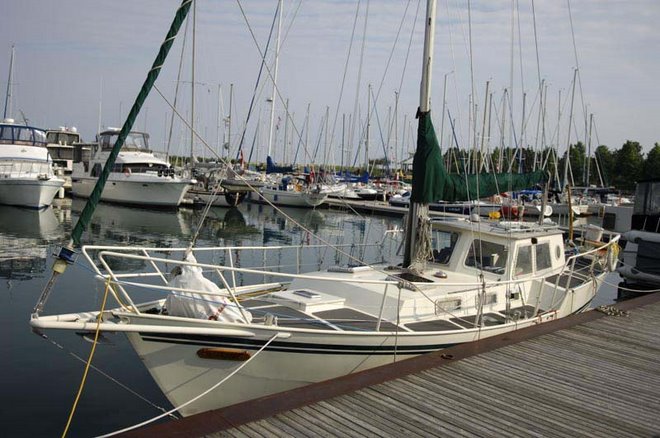 |
| Supposedly rare, these bright little twerps seem to dislike my head |
 |
| To make? Small change. To buy? Oy. |
Despite the very common nature of ZF transmissions, both mechanical and hydraulic, and also despite the fact that this specific filter is used in a wide range of Hurth transmissions, including ones suitable for engines seven times more powerful than ours, it was a hard item to source and the prices quoted had no relationship to each other, or indeed, to reality.
Such is the process of spares acquisition, unfortunately. A filter is a simple thing: oil filters, being common, are cheap and plentiful. "Marine", however, infers a yachtie level of free cash sloshing around the bilges, and this is reflected in the price. My odyssey of bargain-hunting (which is very much a relative term in this case) involved about eight phone calls to various local suppliers. Few had the filters or knew how to get them. One took several calls and messages to get back to me and then couldn't quote a price ("...ah, maybe a hundred and a quarter?"). One very helpful woman, Peggy from Eastmar Marine, was able to find this filter, but the price varied from $135 to over $210 Canadian. Keep in mind that this is something I'm supposed to change every 300 hours. I could put 4,000 hours on in the next five years.
I did find one on eBay for $50 in American currency...but the "freight fee" for this 50 gram little box was an additional $45! I have, as has proven to be wise, a U.S.-dollar VISA card and some funds in that denomination tucked away for these sort of purchases, but the price galled me. I went to the ZF Parts distributor list and found the one place that had a toll-free number. I wasn't going to compound my wallet's reaming with mid-day long-distance charges. The laconic but efficient Georgian on the other end of the line said "yes, I have some at $50." I said "how many do you have?" "Five." "I'll take them all." They are a consumable, after all, and I care not to worry about this until I have 1,525 hours on the tach. They arrived in about four days and cost, all in with freight and customs, about $350 U.S., or $70 per. This was still cheaper, even with the exchange rate, than the cheapest, if vague, Canadian supplier's price, and while I'm not happy with it, I am more content than had I bought one and one alone around here.
 |
| I've often thought of marine mechanicals manuals as the Berlitz course of sailing |
Hmm. The diagram in the manual suggested low (naturally) on the housing and on the starboard side. Feeling around didn't reveal much save for the cooling fins (or what I assume do that on a hot transmission). Fetch the extendable dental mirror. Nope. Get the inspection camera. Wow, needs a spot of paint, but no plug. Then...ah hah! I felt the port side of the housing. There you go.
The plug was a brass hex bolt with a straight thread, gasketed with an O-ring. It was a European piece of kit and so was presumably metric. I had only one socket, however, that fit: 7/8th inch. And it wasn't so snug. That suggested 22 or 23 mm...sockets I (of course) lack. I top out at 21 mm. Again, this is utterly typical of the refit experience.
The draining did not go well. I needed a third hand as I was doing this over the metre-deep aft bilge and I didn't want to drop the plug. I needed a bigger funnel, a bigger measuring cup or (ideally) a sort of pan I could hang off the transmission to capture the draining fluid. While I got the job done, somewhat messily, it led me to consider alternatives to a drain plug, which led to an interesting bit of crowd wisdom on a sailing forum.
 |
| The good part here is that two jugs of fluid are good for over five changes. If I don't spill it. |
 |
| Some of the many jugs necessary for smooth operation. |
Next comes the first oil change at 50 hours. I feel that will go more smoothly (the Beta has an oil change pump on one side) and certainly more cheaply. But the lesson here is it pays to shop and it pays to buy, where logical to do so, in bulk for those things you can anticipate using, like filters, gaskets and other "consumables". The freight for a dozen is often barely more than the freight for one.




No comments:
Post a Comment